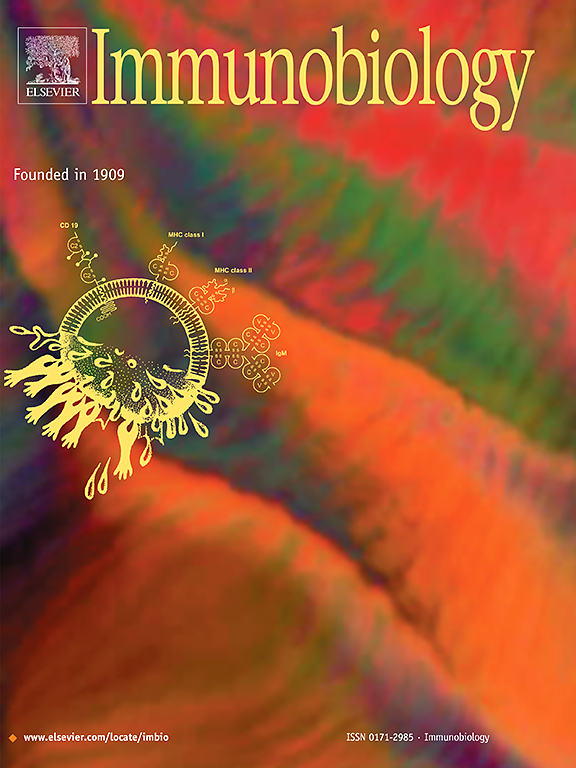HMGB1 regulates the activation of dendritic cells and CD4+ T cell responses through the modulation of autophagy in bleomycin-induced pulmonary fibrosis
IF 2.3
4区 医学
Q3 IMMUNOLOGY
引用次数: 0
Abstract
Background
The role of HMGB1 in inflammation and autophagy has garnered increasing attention; however, its impact on the activation of dendritic cells (DCs) and autophagy remains unclear. This study aims to explore the effects of HMGB1 on DC activation, autophagy, and its influence on CD4+ T cell responses in a bleomycin-induced pulmonary fibrosis (PF) mouse model.
Methods
Thirty mice were randomly divided into control and model groups. The model group was established by intratracheal injection of bleomycin to induce PF. Flow cytometry was used to detect DC surface markers, and western blot was employed to assess the expression of autophagy-related protein LC3. Lung DCs and peripheral blood CD14+ monocytes were sorted using magnetic beads and differentiated into M0-DCs, which were then subjected to HMGB1 stimulation experiments to assess activation and cytokine secretion. HMGB1-stimulated or untreated M0-DCs were co-cultured with CFSE-labeled naive CD4+ T cells to evaluate T cell proliferation and differentiation. The effects of HMGB1 on DCs activation, cytokine secretion, and autophagy-related protein expression were assessed after treatment with autophagy regulators.
Results
The model group showed significantly elevated levels of HMGB1 in serum and lung tissues, accompanied by upregulated activation markers of DCs and increased expression of autophagy-related protein LC3. HMGB1 stimulation significantly enhanced the activation of M0-DCs and the secretion of pro-inflammatory cytokines, promoting the proliferation of CD4+ T cells and their differentiation into Th1 and Th17 subsets. Rapamycin, which enhances autophagy, potentiated HMGB1-mediated DC activation, while 3-MA, which inhibits autophagy, suppressed the effects of HMGB1, further influencing CD4+ T cell differentiation.
Conclusion
HMGB1 modulates DC autophagy, thereby affecting their activation and immune responses of CD4+ T cells in bleomycin-induced PF. Targeting HMGB1 and the autophagy pathway may provide new strategies for the treatment of PF.
HMGB1在博莱霉素诱导的肺纤维化中通过调节自噬调节树突状细胞的活化和CD4+ T细胞的应答
HMGB1在炎症和自噬中的作用越来越受到关注;然而,其对树突状细胞(DCs)活化和自噬的影响尚不清楚。本研究旨在探讨HMGB1在博莱霉素诱导肺纤维化(PF)小鼠模型中对DC活化、自噬的影响及其对CD4+ T细胞应答的影响。方法30只小鼠随机分为对照组和模型组。模型组采用气管内注射博来霉素诱导PF,流式细胞术检测DC表面标志物,western blot检测自噬相关蛋白LC3的表达。利用磁珠对肺dc和外周血CD14+单核细胞进行分选,分化为m0 - dc,然后进行HMGB1刺激实验,评估活化和细胞因子分泌情况。hmgb1刺激或未处理的m0 - dc与cfse标记的初始CD4+ T细胞共培养,以评估T细胞的增殖和分化。用自噬调节剂治疗后,评估HMGB1对DCs活化、细胞因子分泌和自噬相关蛋白表达的影响。结果模型组大鼠血清和肺组织HMGB1水平显著升高,dc活化标志物上调,自噬相关蛋白LC3表达升高。HMGB1刺激可显著增强m0 - dc的活化和促炎细胞因子的分泌,促进CD4+ T细胞增殖并向Th1和Th17亚群分化。增强自噬的雷帕霉素可增强HMGB1介导的DC活化,而抑制自噬的3-MA可抑制HMGB1的作用,进而影响CD4+ T细胞分化。结论HMGB1可调节DC细胞自噬,从而影响其活化和CD4+ T细胞的免疫应答,靶向HMGB1及自噬途径可能为PF的治疗提供新的策略。
本文章由计算机程序翻译,如有差异,请以英文原文为准。
求助全文
约1分钟内获得全文
求助全文
来源期刊

Immunobiology
医学-免疫学
CiteScore
5.00
自引率
3.60%
发文量
108
审稿时长
55 days
期刊介绍:
Immunobiology is a peer-reviewed journal that publishes highly innovative research approaches for a wide range of immunological subjects, including
• Innate Immunity,
• Adaptive Immunity,
• Complement Biology,
• Macrophage and Dendritic Cell Biology,
• Parasite Immunology,
• Tumour Immunology,
• Clinical Immunology,
• Immunogenetics,
• Immunotherapy and
• Immunopathology of infectious, allergic and autoimmune disease.
 求助内容:
求助内容: 应助结果提醒方式:
应助结果提醒方式:


